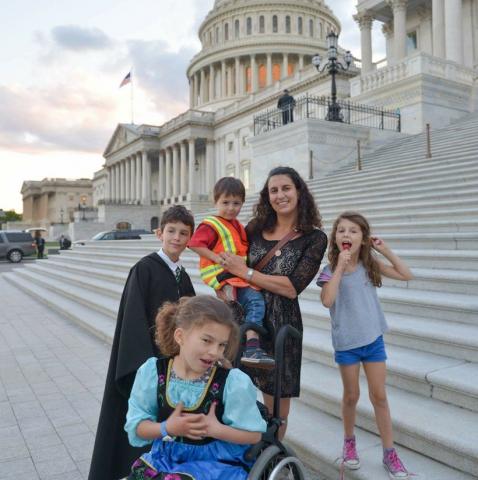
Let’s face it – safety net programs like Medicaid, Children’s Health Insurance Program (CHIP), Supplemental Nutrition Assistance Program, and the medical expenses deduction have a bad rap. For decades we have heard myths about undeserving “welfare Moms” and able-bodied young adults who could work but rely on government subsidies instead. We have been told over and over again that these lazy, unethical people are taking advantage of the system and needlessly placing an undue tax burden on working middle class families.
As a result, millions of Americans who rely on these programs have been quiet about how their reliance on these programs and what their lives would be like without them. I was one of them.
My eleven year old daughter Claire has multiple and severe disabilities. She relies on services provided by Medicaid to get through each day and I rely on Medicaid to cover the significant costs that her private insurance does not cover for services that allow her stay healthy, live at home, attend school, and be a part of our community.
By outward appearances my family is doing fine. My husband and I both work and have excellent health insurance. Yet, before the Affordable Care Act (ACA) was enacted we spent years paying $1,000 a month out of pocket for our health insurance premium for our then family of four and an average of $120 a week in co-pays in addition to other out-of-pocket costs. Because my daughter had multiple pre-existing conditions, we had no choice but to pay whatever the plan available through my husband’s employer demanded, knowing that otherwise she would be completely uninsurable.
While we got by, we stayed in small apartment and went without a car even as our family grew. The cost of equipment, like a hearing aid and a wheelchair, that our private insurance denied was staggering, especially as I had to leave my full-time job to provide the care my daughter needed. The non-covered costs of caring for a child who had complex medical needs and was dependent on others for her every need was staggering. Finally, when Claire was four, we applied for a Katie Becket Medicaid waiver as last-ditch effort to keep her safe and healthy and avoid bankruptcy.
While medical insurance is vital, it’s still insurance. Just like a homeowner’s plan, a typical health insurance plan only insures certain types of medical needs. If your plan excludes hearing aids, home care, or medically necessary therapies you are simply out of luck. That’s the plan you signed up for and the one you are stuck with even if your needs exceed your coverage and ability to pay. If you are unlucky enough to find yourself in this situation, you have the choice to suffer or turn to a safety net program, like we did.
Yet, instead of expressing how grateful I am for these programs that are literal lifelines for my family and so many others, I quietly worried about what would happen if someone found out that my family was receiving government assistance and how they would judge us. Instead of reassuring others that protections would be there to help them if they or their child become disabled or ill or if they lost their job or health insurance, we pretended that we were managing all on our own and that they could too.
Instead of talking openly about what a loss of Medicaid would mean for our family, that Claire would likely not be able to access all of the medical care she needs and that she would no longer be able to live at home with her family, I chose to keep my worries to myself and let them keep me up many nights unwilling to speak of them aloud. I worried about being seen as lazy and undeserving, even though the reality is there is not much more my husband and I could do to be providing for our children. Selling our home and car would not be enough to cover the cost of our daughter’s care, even with her private insurance, for very long.
This summer, all of that changed when Medicaid and other safety net programs came under attack. Overnight, I realized that it was a grave mistake to stay quiet for so long. If I and the millions of others who rely on these programs to stay healthy and stay afloat talked openly about who really benefits from these so-called “government handouts” and what would happen if they were taken away, perhaps these programs would never have come under attack in the first place.
Since I “came out” others have started confiding in me about the government services they receive too. One friend relies on CHIP to provide insurance for her three young children and in exchange she and her husband can both run small businesses. Another friend confided that even though looking at her family’s “bottom line” it’s hard to feel sorry for her, that she relied on the medical expenses deduction to help get through a couple of very hard years when she was being treated for cancer and her son needed medically necessary therapy his private insurance would not cover. A pediatrician recently told me that even though she and her husband are both doctors, her son had relied on Medicaid for access to care.
Over 74 million Americans receive insurance through Medicaid or CHIP, including one in five children. Over 45 million Americans rely on SNAP, over half of whom are children and the elderly. Millions of others rely on the medical expenses tax deduction to help keep them afloat when medical expenses become overwhelming. Chances are very good you know someone receiving benefits under one of these programs, even if they don’t openly talk about their need.
We all need to start talking about how safety net programs help our families and where would be without them. We need to tell our neighbors, our friends, and especially our Congressmen and Senators. We need to start talking now to save them.



The views and opinions expressed in this post are those of the author(s) and do not necessarily reflect those of MomsRising.org.
MomsRising.org strongly encourages our readers to post comments in response to blog posts. We value diversity of opinions and perspectives. Our goals for this space are to be educational, thought-provoking, and respectful. So we actively moderate comments and we reserve the right to edit or remove comments that undermine these goals. Thanks!